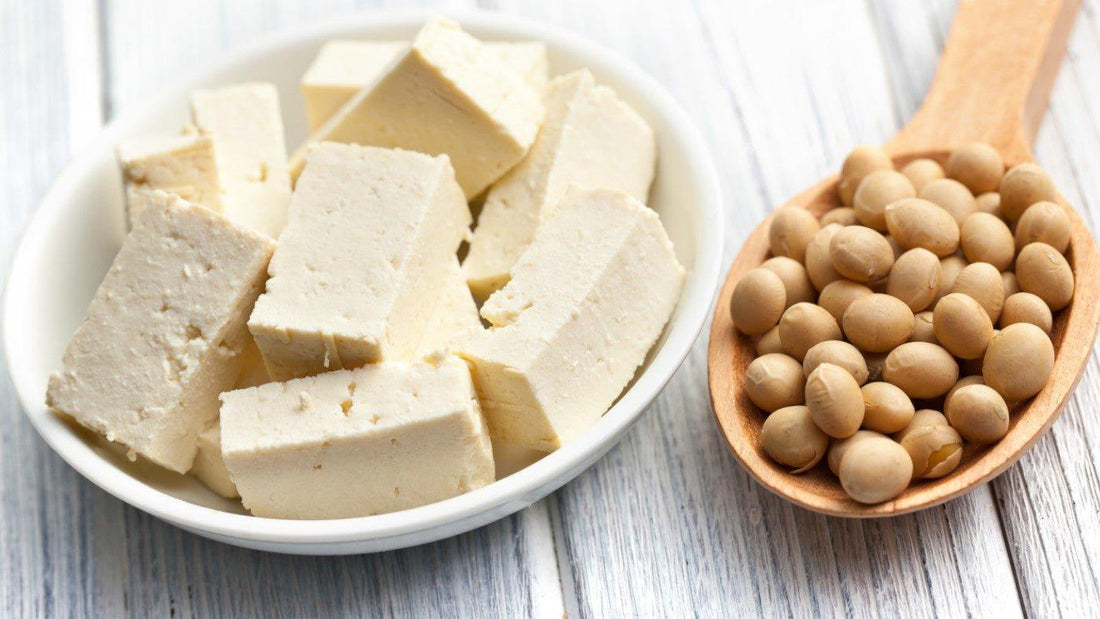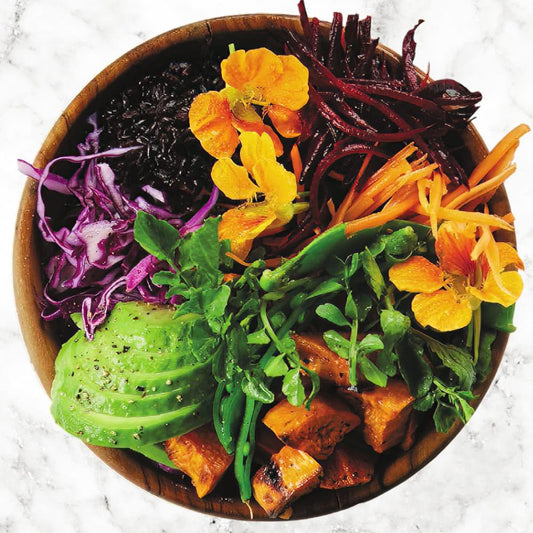“Living in today’s plant-based world, it's not surprising to discover tofu in every grocery store in North America. But what you might find surprising is that tofu has been around for centuries! Apparently, the first written record of tofu dates back to 950 A.D”
“Soybeans and soy foods may reduce the risk of a range of health problems, including cardiovascular disease, stroke, coronary heart disease, blood sugar issues, and some cancers. Moreover, it can improve bone health.” [1]
What is Tofu Exactly?
In a nutshell, tofu is an unfermented food that is made by processing soybean curd. This comprises three different ingredients: soybeans, water, and a coagulant such as calcium sulfate (gypsum) or magnesium chloride (nigari). Just as when making cheese, a coagulant is used to curdle the fluid, thus making it solid [1].

After a quantity of dried raw soybeans have been soaked in water overnight, the softened soybeans are placed in a blender and then blended to produce soymilk. After this, the coagulant is put into the soymilk to form curds, and these are then drained and pressed into blocks to create tofu! This tofu can then be pressed again to eliminate the moisture, thereby producing medium, firm, or extra firm textures.
Also, when it comes to storing tofu, if you do not consume it all in one go, simply put the remainder in an airtight container and put it in the fridge (it will last for a few days). You will then have to change the water every day [1].
Did You Know?

Did you know that soy is not just a high-quality protein; it is also one of the few plant foods (alongside quinoa and amaranth seed), which houses all the essential amino acids, like those found in meat [2]? Note: essential amino acids (protein constituents) cannot be manufactured by the body; therefore, we have to consume them. Obviously, this is very important for anyone on a vegan or plant-based diet!
And are you aware that tofu is a staple ingredient in Chinese and Thai cuisine? Moreover, there are numerous tofu recipes that take advantage of the various ways to transform its texture from soft and smooth to deliciously crunchy and crisp [3].
Mega Nutritional Benefits of Soy
- Rich in top quality plant-based protein
- Bursting with fiber
- Free of cholesterol
- Low in saturated fat
- An excellent source of omega-3 essential fatty acids
- A great source of valuable antioxidants and phytonutrients (for example, phytoestrogens)
- Free of lactose [2].
Outstanding Health Benefits Soybeans
Bumper-Packed With Protective Antioxidants

“Soya beans are especially rich in isoflavones & provide other active plant compounds, such as saponins” [3]
Tofu contains natural compounds known as isoflavones. These act as powerful antioxidants, which help reduce oxidative stress. The latter refers to an imbalance between free radicals and antioxidants in our body, which can lead to cell and tissue damage, rapid aging, ill health, and chronic disease. Antioxidants fight this scenario, and this is why it is so important to regularly consume anti-oxidant-rich foods such as tofu.
Supporting Heart Health
“Eating tofu & other soy-based foods with high levels of isoflavones may lower the risk of heart disease, according to a new study from Harvard T.H. Chan School of Public Health [3], this is thought to be because they are a rich source of phytochemicals as well as fibre” [2]
Science-backed studies show that there's a link between consuming foods (such as tofu), which are high in isoflavones, and lowering cholesterol. Moreover, this also includes reducing total cholesterol and bad cholesterol (which is known as LDL or low-density lipoprotein) [3].
Helping Blood Sugar Management
Nutrition scientists have identified the molecular pathway that allows foods rich in soy bioactive compounds called isoflavones to lower diabetes & heart disease risk. Eating soy foods has been shown to lower cholesterol, decrease blood glucose levels, and improve glucose tolerance in people with diabetes. One particular study involving post-menopausal women who ate 100mg of soy isoflavones every day showed “a reduction in fasting blood sugar levels by 15% & insulin levels by 23% [2, 4].
Managing blood sugar by switching to a plant-based diet is becoming increasingly important as diabetes is soaring beyond all proportions. In fact, according to the CDC National Diabetes Statistic Report, 2020, “Among the US population overall, crude estimates for 2018 were: 34.2 million people of all ages—or 10.5% of the US population—had diabetes. 34.1 million adults aged 18 years or older—or 13.0% of all US adults—had diabetes”.
An Excellent Source of Complete Plant Protein

Soya, and as a consequence, tofu, is a first-class source of plant protein because it empowers us with all of the nine protein constituents (amino acids) that are vital for regeneration, growth, immunity, and other crucial body functions. Further, and very importantly, “digestibility of the protein in soya, which refers to how well our body can use the protein, is good, with some studies suggesting it may even be comparable to that of animal protein” [3]. If that is the case, the latter is fantastic news!
Helps to Ameliorate Menopausal Symptoms
Few women are lucky enough to escape the onslaught of unwelcome menopausal symptoms, and that is why finding a natural cure by way of consuming tofu is the way to go! Isoflavones are frequently described as being phyto-oestrogens, that is to say, they imitate a weak form of the hormone oestrogen, and to that end, some sufferers find that consuming tofu ameliorates various peri-menopausal symptoms such as hot flushes and low mood [3].
Sources
[1]. Better Health Channel Victoria Government Australia (2020). “Soy Beans & Soy Foods.”
[2]. Lewin J. (2021). “Top 5 health benefits of tofu.” BBC Good Food.






